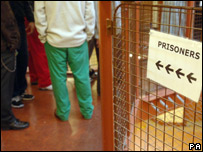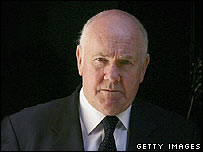
There are plans for victims to sit on parole boards
|
Victims of crime could be given a say on whether offenders should be freed from jail, under plans being considered by the home secretary.
John Reid said victims or their representatives would be appointed to parole boards from next month.
It comes amid increasing concern that the rights of offenders are being given too much prominence and controversy over the early release of criminals.
Mr Reid told the Parole Board victims' voices "must be heard more clearly".
Ahead of the speech, a Parole Board spokesman said it would listen with interest to what the home secretary said.
Decisions questioned
Mr Reid said: "I tell you today that I want to go further in ensuring that victims or their representatives get a greater say about the release of offenders back into the community.
"I believe that the victim's voice must be heard more clearly than it has in the past.
"That is why we're already interviewing for members, with experience of either being a victim, or of a victim support organisation.
"And I can tell you that by June, the first members with that experience will have been appointed to parole boards."
But the Home Office said the victim of a particular crime would not be sitting on the parole board hearing of that offender.

Mr Reid told the Parole Board public protection must take priority
|
Concern over the rights of offenders versus victims has been highlighted by the report into the Anthony Rice case.
Earlier this month, the report concluded Rice, 48, a violent sex attacker who murdered a woman nine months after leaving prison, should never have been set free.
And there was criticism of the panel that freed Damien Hanson, who went on to murder financier John Monckton in November 2004.
Parole panels
There have been allegations that the Parole Board of England and Wales, which is meant to place the protection of the public as its top priority, is giving the rights of offenders too much weight.
David Hines, whose daughter was murdered, said he welcomed any move which would give victims greater say.
"We, quite frankly, are fed up with people being released to go out and kill again," he said. "We feel that we should have somebody representing us and how we think."
But shadow home secretary David Davis said he had reservations about whether the scheme would work in practice.
"Of itself, I think it is maybe a good idea," he said.
But, he continued, the foreign criminals scandal had revealed that people were being released from jail without a panel interview - in one case on the basis of a telephone call.
"I am sorry but this does look like another headline grabbing idea and unless it turns into reality it won't give people the safety they deserve," he said.
Under the current approach, prisoners serving fixed sentences can apply for early release on licence once they have served half the time.
And individuals deemed to be dangerous can apply once they have served their "tariff". A parole panel, in either case, must decide whether the person is safe to be released.
Currently, only a small number of the 160 parole board members who sit on panels belong to victims' organisations.


~RS~q~RS~~RS~z~RS~19~RS~)